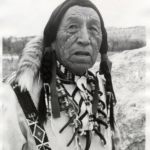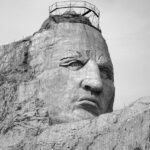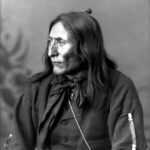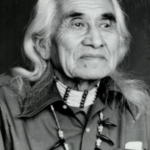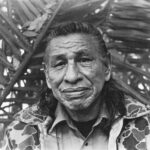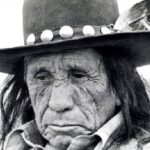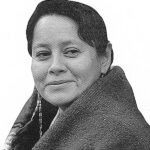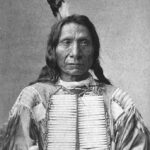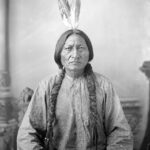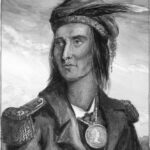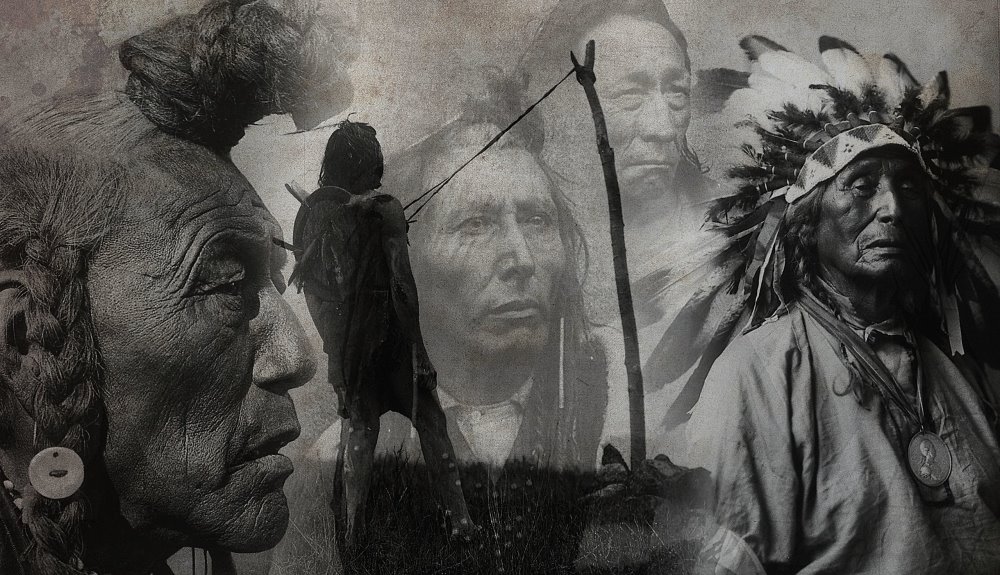
We, the great mass of the people, think only of the love we have for our land; we do love the land where we were brought up. We will never let our hold to this land go. To let it go it will be like throwing away (our) mother that gave (us) birth. —Aitooweyah, Cherokee
It is better to have less thunder in the mouth and more lightning in the hand. —Apache proverb
All plants are our brothers and sisters. They talk to us and if we listen, we can hear them. —Arapaho proverb
These were the words given to my great-grandfather by the Master of Life: At some time, there shall come among you a stranger, speaking a language you do not understand. He will try to buy the land from you, but do not sell it; keep it for an inheritance to your children. —Aseenewub, Red Lake Ojibwe
Most of us do not look as handsome to others as we do to ourselves. —Assiniboine proverb
The Great Spirit is in all things, he is in the air we breathe. The Great Spirit is our Father, but the Earth is our Mother. She nourishes us, that which we put into the ground she returns to us. —Big Thunder or Bedagi aka Frank Loring, Wabanaki Algonquin, Penobscot, ME (1827-1906)
The life of an Indian is like the wings of the air. That is why you notice the hawk knows how to get his prey. The Indian is like that. The hawk swoops down on its prey; so does the Indian. In his lament, he is like an animal. For instance, the coyote is sly; so is the Indian. The eagle is the same. That is why the Indian is always feathered up; he is a relative to the wings of the air. —Black Elk
You have noticed that everything as Indian does is in a circle, and that is because the Power of the World always works in circles, and everything tries to be round . . . The Sky is round, and I have heard that the earth is round like a ball, and so are all the stars. The wind, in its greatest power, whirls. Birds make their nest in circles, for theirs is the same religion as ours . . . Even the seasons form a great circle in their changing, and always come back again to where they were. The life of a man is a circle from childhood to childhood, and so it is in everything where power moves. —Black Elk
The growing and dying of the moon reminds us of our ignorance which comes and goes; but when the moon is full, it is as if the Great Spirit were upon the whole world. —Black Elk
Then I was standing on the highest mountain of them all, and round about beneath me was the whole hoop of the world. And while I stood there I saw more than I can tell and I understood more than I saw; for I was seeing in a sacred manner the shapes of all things in the spirit, and the shape of all shapes as they must live together like one being. And I say the sacred hoop of my people was one of the many hoops that made one circle, wide as daylight and as starlight, and in the center grew one mighty flowering tree to shelter all the children of one mother and one father. And I saw that it was holy . . . But anywhere is the center of the world. —Black Elk
Like the grasses showing tender faces to each other, thus should we do, for this was the wish of the Grandfathers of the world. —Black Elk
Great Spirit, Great Spirit, my Grandfather, all over the earth the faces of living things are all alike . . . Look upon these faces of children without number and with children in their arms, that they may face the winds and walk the good road to the day of the quiet. —Black Elk
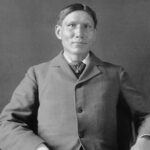 Charles Alexander Eastman
Charles Alexander Eastman or Ohíye S’a “Wins Often”
Wahpeton Santee Sioux
South Dakota, USA
(1858-1939)
It was our belief that the love of possessions is a weakness to be overcome. Its appeal is to the material part, and if allowed its way, it will, in time, disturb one’s spiritual balance. Therefore, children must early learn the beauty of generosity. They are taught to give what they prize most, that they may taste the happiness of giving. —Charles Alexander Eastman
The Wise Man believes profoundly in silence—the sign of a perfect equilibrium. Silence is the absolute poise or balance of body, mind, and spirit. The man who preserves his selfhood, is ever calm and unshaken by the storms of existence; not a leaf, as it were, astir on the tree, not a ripple upon the surface of the shinning pool. His, in the mind of the unlettered sage, is the ideal attitude and conduct of life. Silence is the cornerstone of character. —Charles Alexander Eastman
The true Indian sets no price upon either his property or his labor. His generosity is limited only by his strength and ability. He regards it as an honor to be selected for difficult or dangerous service and would think it shameful to ask for any reward, saying rather: “Let the person I serve express his thanks according to his own bringing up and his sense of honor. —Charles Alexander Eastman
The logical man must either deny all miracles or none. —Charles Alexander Eastman
One of the things that makes you feel good is to get out into nature—go walking, go hiking, go swimming in the ocean, or wherever you live, in a river or a lake, experience the beauty of America, experience how America is such a sacred place. Everywhere you go in this land, our people have been there and they have said, This place is sacred. —Charles Alexander Eastman
Friendship is held to be the severest test of character. It is easy, we think, to be loyal to a family and clan, whose blood is in your own veins. —Charles Alexander Eastman
Clear your mind of all dread and suspicion; this is the first step in the wilderness life. Think not the water will drown you, or that anything in the water or on land will bite or poison you. Have confidence in nature and yourself. Perhaps three-fourths of your physical failures are due to lack of nerve and will-power. —Charles Alexander Eastman
When a man does a piece of work which is admired by all, we say that it is wonderful; but when we see the changes of day and night, the sun, the moon, and the stars in the sky, and the changing seasons upon the earth, with their ripening fruits, anyone must realize that it is the work of someone more powerful than man. —Chased-by-Bears, Santee-Yanktonai Sioux (1843-1915)
O’ Great Spirit, help me always to speak the truth quietly, to listen with an open mind when others speak, and to remember the peace that may be found in silence. —Cherokee prayer
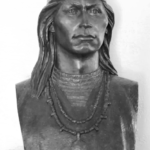 Cochise
Cochiseor K’uuch’ish “Having-The-Quality/Strength-Of-An-Oak”
Chiracahua Apache
Arizona, USA
(1805-1874)
I am alone in the world. I want to live in these mountains; I do not want to go to Tularosa. That is a long way off. I have drunk of the waters of the Dragoon Mountains and they have cooled me: I do not want to leave here. —Cochise
One does not sell the land people walk on. —Crazy Horse
I was hostile to the white man . . . We preferred hunting to a life of idleness on our reservations. At times we did not get enough to eat and we were not allowed to hunt. All we wanted was peace and to be let alone. Soldiers came . . . in the winter . . . and destroyed our villages. Then Long Hair [Custer] came . . . They said we massacred him, but he would have done the same to us. Our first impulse was to escape…but we were so hemmed in we had to fight. After that, I lived in peace, but the government would not let me alone. I was not allowed to remain quiet. I was tired of fighting . . . They tried to confine me . . . and a soldier ran his bayonet into me. I have spoken. —Crazy Horse
A very great vision is needed, and the man who has it must follow it as the eagle seeks the deepest blue of the sky. —Crazy Horse
Listen or your tongue will keep you deaf. —Cree National proverb
When all the trees have been cut down;
When all the animals have been hunted;
When all the waters are polluted;
When all the air is unsafe to breathe;
Only then will you discover you cannot eat money.
—Cree prophecy
While I speak, be kind and patient. I have to speak for my people, who are numerous, and who rely upon me to follow that course which in the future will tend to their good. The plains are large and wide. We are the children of the plains, it is our home, and the buffalo has been our food always. I hope you look upon the Blackfeet, Bloods and Sarcees as your children now, and that you will be indulgent and charitable to them. They all expect me to speak now for them, and I trust the Great Spirit will put into their breasts to be a good people – into the minds of the men, women and children, and their future generations. —Crowfoot
The beauty of the trees, the softness of the air, the fragrance of the grass, speaks to me. The summit of the mountain, the thunder of the sky, the rhythm of the sea, speaks to me. The strength of the fire, the taste of salmon, the trail of the sun, and the life that never goes away, they speak to me. And my heart soars. —Dan George
My mother had a kindness that embraced all life. She knew her place well and was comfortable in giving everything she had. This is the tradition of native women. —Dan George
Where no one intrudes, many can live in harmony. —Dan George
The time will soon be here when my grandchild will long for the cry of a loon, the flash of a salmon, the whisper of spruce needles, or the screech of an eagle. But he will not make friends with any of these creatures; and when his heart aches with longing, he will curse me. Have I done all to keep the air fresh? Have I cared enough about the water? Have I left the eagle to soar in freedom? Have I done everything I could to earn my grandchild’s fondness? —Dan George
May the stars carry your sadness away,
May the flowers fill your heart with beauty,
May hope forever wipe away your tears,
And, above all, may silence make you strong.
—Dan George
Love is something you and I must have. We must have it because our spirit feeds upon it. We must have it, because without it we become weak and faint. Without love our self-esteem weakens. Without it our courage fails. Without love we can no longer look out confidently at the world. Instead we turn inwardly and begin to feed upon our own personalities and little by little we destroy ourselves. You and I need the strength that comes from knowing that we are loved. With it we are creative. With it we march tirelessly. With it, and with it alone, we are able to sacrifice ourselves for others. —Dan George
When in the Circle, no one is in front of you. No one is behind you. No one is above you. No one is below you. The Sacred Circle is designed to create unity. —Dave Yakima Chief
We must protect the forests for our children, grandchildren and children yet to be born. We must protect the forests for those who can’t speak for themselves such as the birds, animals, fish and trees. —Edward Moody or Qwatsinas “Spirit-of-the-Raven”, Nuxalk Nation, British Columbia, Canada
The Indian made an effort to know of spiritual things from his own observations of nature, because all truth can be found in Nature. There is a spiritual beauty in the realization that the world has been deliberately made or created, and is in perfect balance ecologically, and that is not by chance. Lastly, it is based upon spiritual revelation of the truth to the individual. When it happens for you, you then KNOW . . . and no one else can tell you otherwise. —Eli Gatoga, Cherokee, Arkansas, USA (1914-1983)
From Wakan-Tanka, the Great Mystery, comes all power. It is from Wakan-Tanka that the holy man has wisdom and the power to heal and make holy charms. Man knows that all healing plants are given by Wakan-Tanka, therefore they are holy. So too is the buffalo holy because it is the gift of Wakan-Tanka. —Flat-Iron or Maza Blaska, Oglala Sioux (1899-)
Among the Indians there have been no written laws. Customs handed down from generation to generation have been the only laws to guide them. Every one might act different from what was considered right did he choose to do so, but such acts would bring upon him the censure of the Nation. This fear of the Nation’s censure acted as a mighty band, binding all in one social, honorable compact. —George Copway or Kah-ge-ga-bowh “He Who Stands Forever,” Mississaugas Ojibway (1818-1847)
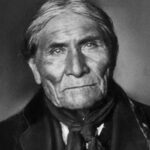 Geronimo
Geronimoor Goyaałé “The-One-Who-Yawns”
Bedonkohe band of Ndendahe Apache
New Mexico and Arizona, USA
(1829-1909)
I cannot think that we are useless or God would not have created us. There is one God looking down on us all. We are all the children of one God. The sun, the darkness, the winds are all listening to what we have to say. —Geronimo
When a child, my mother taught me the legends of our people; taught me of the sun and sky, the moon and stars, the clouds and storms. She also taught me to kneel and pray to Usen for strength, health, wisdom, and protection. We never prayed against any person, but if we had aught against any individual, we ourselves took vengeance. We were taught that Usen does not care for the petty quarrels of men. —Geronimo
When it comes time to die, be not like those whose hearts are filled with the fear of death, so when their time comes, they weep and pray for a little more time to live their lives over again in a different way. Sing your death song, and die like a hero going home. —Hendrick Aupumut, Mohican (1757-1830)
Don’t be afraid to cry. It will free your mind of sorrowful thoughts. —Hopi proverb
When I am dead, cry for me a little. Think of me sometimes, but not too much. It is not good for you or your wife or your husband or your children to allow your thoughts to dwell too long on the dead. Think of me now and again as I was in life, at some moment which is pleasant to recall, but not for long. Leave me in peace as I shall leave you, too, in peace. While you live, let your thoughts be with the living. —Ishi, Yahi
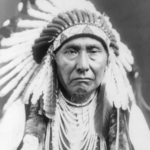 Joseph aka Chief Joseph
Joseph aka Chief Joseph or Hinmatóowyalahtq̓it “Thunder Rolling Down the Mountain”
Wallowa band of Nez Perce
Pacific Northwest, USA
(1840-1904)
We are taught to believe that the Great Spirit sees and hears everything, and that he never forgets; that hereafter He will give every man a spirit-home according to his deserts . . . This I believe, and all my people believe the same. —Chief Joseph
It does not require many words to speak the truth. —Chief Joseph
If the white man wants to live in peace with the Indian, he can live in peace . . . Treat all men alike. Give them all the same laws. Give them all an even chance to live and grow. All men were made by the same great Spirit Chief. They are all brothers. The Earth is the Mother of all people, and all people should have equal rights upon it. Let me be a free man, free to travel, free to stop, free to work, free to trade where I choose my own teachers, free to follow the religion of my fathers, free to think and talk and act for myself, and I will obey every law or submit to the penalty. —Chief Joseph
Whenever the white man treats the Indian as they treat each other, then we will have no more wars. We shall all be alike–brothers of one father and one another, with one sky above us and one country around us, and one government for all. —Chief Joseph
We live, we die, and like the grass and trees, renew ourselves from the soft clods of the grave. Stones crumble and decay, faiths grow old and they are forgotten, but new beliefs are born. The faith of the villages is dust now . . . but it will grow again . . . like the trees. May serenity circle on silent wings and catch the whisper of the winds. —Chief Joseph
Before our white brothers came to civilize us we had no jails. Therefore we had no criminals. You can’t have criminals without a jail. We had no locks or keys, and so we had no thieves. If a man was so poor that he had no horse, tipi or blanket, someone gave him these things. We were too uncivilized to set much value on personal belongings. We wanted to have things only in order to give them away. We had no money, and therefore a man’s worth couldn’t be measured by it. We had no written law, no attorneys or politicians, therefore we couldn’t cheat. We really were in a bad way before the white men came, and I don’t know how we managed to get along without these basic things which, we are told, are absolutely necessary to make a civilized society. —Lame Deer
Listen to the air. You can hear it, feel it, smell it, taste it. Woniya wakan—the holy air—which renews all by its breath. Woniya, woniya wakan—spirit, life, breath, renewal—it means all that. Woniya—we sit together, don’t touch, but something is there; we feel it between us, as a presence. A good way to start thinking about nature, talk about it. Rather talk to it, talk to the rivers, to the lakes, to the winds as to our relatives. —Lame Deer
All Creatures exist for a purpose. Even an ant knows what that purpose is—not with its brain, but somehow it knows. Only human beings have come to a point where they no longer know why they exist. —Lame Deer
I have seen that in any great undertaking it is not enough for a man to depend simply upon himself. —Lone Man or Isna-la-wica, Brulé Titonwan Lakota, South Dakota, USA (1760-1826)
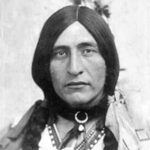 Luther Standing Bear
Luther Standing Bear or Óta Kté “Plenty Kill” aka Matȟó Nážiŋ “Standing Bear”
Sicangu and Oglala Lakota
South Dakota, USA
(1868-1939)
Wherever forests have not been mowed down, wherever the animal is recessed in their quiet protection, wherever the earth is not bereft of four-footed life—that to the white man is an unbroken wilderness. But for us there was no wilderness, nature was not dangerous but hospitable, not forbidding but friendly. Our faith sought the harmony of man with his surroundings; the other sought the dominance of surroundings. For us, the world was full of beauty; for the other, it was a place to be endured until he went to another world. But we were wise. We knew that man’s heart, away from nature, becomes hard. —Luther Standing Bear
There was no such thing as emptiness in the world. Even in the sky there were no vacant places. Everywhere there was life, visible and invisible, and every object possessed something that would be good for us to have also—even to the very stones. —Luther Standing Bear
Never rail at the storms, the furious winds, the biting frosts and snows . . .Bright days and dark days are both expressions of the great mystery. —Luther Standing Bear
There is a road in the hearts of all of us, hidden and seldom traveled, which leads to an unkown, secret place. The old people came literally to love the soil, and they sat or reclined on the ground with a feeling of being close to a mothering power. Their teepees were built upon the earth and their altars were made of earth. The soul was soothing, strengthening, cleansing, and healing. That is why the old Indian still sits upon the earth instead of propping himself up and away from its life giving forces. For him, to sit or lie upon the ground is to be able to think more deeply and to feel more keenly. He can see more clearly into the mysteries of life and come closer in kinship to other lives about him. —Luther Standing Bear
As a child I understood how to give, I have forgotten this grace since I have become civilized. —Luther Standing Bear
The American Indian is of the soil, whether it be the region of forests, plains, pueblos, or mesas. He fits into the landscape, for the hand that fashioned the continent also fashioned the man for his surroundings. He once grew as naturally as the wild sunflowers; he belongs just as the buffalo belonged. —Luther Standing Bear
Out of the Indian approach to life there came a great freedom, an intense and absorbing respect for life, enriching faith in a Supreme Power, and principles of truth, honesty, generosity, equity, and brotherhood as a guide to mundane relations. —Luther Standing Bear
I will follow the white man’s trail. I will make him my friend, but I will not bend my back to his burdens. I will be cunning as a coyote. I will ask him to help me understand his ways, then I will prepare the way for my children and their children. The Great Spirit has shown me—a day will come when they will outrun the white man in his own shoes. —Many Horses, Oglala Lakota, South Dakota, USA
Once I was in Victoria, and I saw a very large house. They told me it was a bank and that the white men place their money there to be taken care of, and that by and by they got it back with interest. We are Indians, and we have no such bank; but when we have plenty of money or blankets, we give them away to other chiefs and people, and by and by they return them with interest, and our hearts feel good. Our way of giving is our bank. —Maquinna “Possessor-Of-Pebbles,” Nuu-chah-nulth of Nootka, Pacific Northwest, Canada
Always I waited for the summer, for the prairie sun, the Badlands sun, to tan me and make me into a real skin. —Mary Brave Bird
The little settlements we lived in—He Dog, Upper Cut Meat, Parmelee, St. Francis, Belvidere—were places without hope where bodies and souls were being destroyed bit by bit. Schools left many of us almost illiterate. We were not taught any skills. The land was leased to white ranchers. Jobs were almost nonexistent on the reservation, and outside the res, whites did not hire Indians if they could help it. —Mary Brave Bird
Moral power is always more dangerous to an oppressor than political force. —Mary Brave Bird
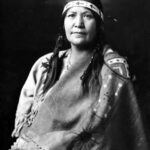 Mourning Dove
Mourning Dove or Humishuma aka Christine Quintasket
Okanogan First Nations
Idaho, USA
(ca. 1884-1936)
It was supposed that lost spirits were roving about everywhere in the invisible air, waiting for children to find them if they searched long and patiently enough . . . [The spirit] sang its spiritual song for the child to memorize and use when calling upon the spirit guardian as an adult. —Mourning Dove
For an important marriage the chief presided, aided by his wife. He passed a pipe around the room so each could share a smoke in common. In this way families were publicly united to banish any past or future disagreements and thus stood as “one united.” The chief then gave the couple an oration of his advice, pointing out the good characteristics of each, and then offered his congratulations to them for a happy future. —Mourning Dove
Children were encouraged to develop strict discipline and a high regard for sharing. When a girl picked her first berries and dug her first roots, they were given away to an elder so she would share her future success. When a child carried water for the home, an elder would give compliments, pretending to taste meat in water carried by a boy or berries in that of a girl. The child was encouraged not to be lazy and to grow straight like a sapling. —Mourning Dove
I do not see a delegation for the four-footed. I see no seat for the eagles. We forget, and we consider ourselves superior. But we are, after all, a mere part of creation. And we must consider to understand where we are. And we stand somewhere between the mountain and the ant. Somewhere and only there as part and parcel of the creation.—Oren Lyons, Turtle Clan Onondaga Nation of the Iroquois Confederacy (1930-)
Hold on to what is good, even if it’s a handful of Earth.
Hold on to what you believe, even if it’s a tree that stands by itself.
Hold on to what you must do, even if it’s a long way from here.
Hold on to your life, even if it’s easier to let go.
Hold on to my hand, even if someday I’ll be gone away from you. —Pueblo blessing
I hope the Great Heavenly Father, who will look down upon us, will give all the tribes His blessing, that we may go forth in peace, and live in peace all our days, and that He will look down upon our children and finally lift us far above the earth; and that our Heavenly Father will look upon our children as His children, that all the tribes may be His children, and as we shake hands to-day upon this broad plain, we may forever live in peace. —Red Cloud
In 1868, men came out and brought papers. We could not read them, and they did not tell us truly what was in them. We thought the treaty was to remove the forts and for us to cease from fighting. But they wanted to send us traders on the Missouri, but we wanted traders where we were. When I reached Washington, the Great Father explained to me that the interpreters had deceived me. All I want is right and just. —Red Cloud
When I was a boy, the Sioux owned the world. The sun rose and set in their land; they sent ten thousand men into battle. Where are the warriors today? Who slew them? Where are our lands? Who owns them? What white man can say I ever stole his land or a penny of his money? Yet they say I am a thief. What white woman, however lonely, was ever captive or insulted by me? Yet they say I am a bad Indian. What white man has ever seen me drunk? Who has ever come to me hungry and left me unfed ? Who has ever seen me beat my wives or abuse my children? What law have I broken? Is it wrong of me to love my own? Is it wicked for me because my skin is red? Because I am a Sioux? Because I was born where my father lived? Because I would die for my people and my country? —Sitting Bull
I am a red man. If the Great Spirit had desired me to be a white man, he would have made me so in the first place. He put in your heart certain wishes and plans; in my heart, he put other and different desires. Each man is good in his sight. It is not necessary for Eagles to be Crows. We are poor . . . but we are free. No white man controls our footsteps. If we must die, we die defending our rights. —Sitting Bull
Yet hear me, friends! We have now to deal with another people, small and feeble when our forefathers first met with them, but now great and overbearing. Strangely enough, they have a mind to till the soil, and the love of possessions is a disease in them. These people have made many rules that the rich may break, but the poor may not! They have a religion in which the poor worship, but the rich will not! They even take tithes of the poor and weak to support the rich and those who rule. They claim this mother of ours, the Earth, for their own use, and fence their neighbors away from her, and deface her with their buildings and their refuse. They compel her to produce out of season, and when sterile she is made to take medicine in order to produce again. All this is sacrilege. —Sitting Bull
I do not wish to be shut up in a corral. All agency Indians I have seen are worthless. They are neither red warriors nor white farmers. They are neither wolf nor dog.” —Sitting Bull
When I am too old and feeble to follow my sheep or cultivate my corn, I plan to sit in the house, carve Kachina dolls, and tell my nephews and nieces the story of my life . . . Then I want to be buried in the Hopi way. Perhaps my boy will dress me in the costume of a Special Officer, place a few beads around my neck, put a paho and some sacred cornmeal in my hand, and fasten inlaid turquoise to my ears. If he wishes to put me in a coffin, he may do even that, but he must leave the lid unlocked, place food nearby, and set up a grave ladder so that I can climb out. I shall hasten to my dear ones, but I will return with good rains and dance as a Katcina in the plaza with my ancestors. —Don Talayesva or Chuka, Hopi Sun Clan, Arizona, USA (1890–1985)
When you arise in the morning, give thanks for the morning light, for your life and strength. Give thanks for your food and the joy of living. If you see no reason for giving thanks, the fault lies in yourself. —Tecumseh
So live your life that the fear of death can never enter your heart. Trouble no one about their religion; respect others in their view, and demand that they respect yours. Love your life, perfect your life, beautify all things in your life. —Tecumseh
Seek to make your life long and its purpose in the service of your people. Prepare a noble death song for the day when you go over the great divide. Always give a word or a sign of salute when meeting or passing a friend, even a stranger, when in a lonely place. Show respect to all people and grovel to none. —Tecumseh
When it comes your time to die, be not like those whose hearts are filled with the fear of death, so that when their time comes, they weep and pray for a little more time to live their lives over again in a different way. Sing your death song and die like a hero going home. —Tecumseh
I was born upon the prairie, where the wind blew free, and there was nothing to break the light of the sun. I was born where there were no enclosures and where everything drew a free breath… I know every stream and every wood between the Rio Grande and the Arkansas. I have hunted over that country. I lived like my fathers before me, and like them, I lived happily. —Ten Bears or Pawʉʉrasʉmʉnurʉ, Yamparethka Comanche, New Mexico and Texas, USA (ca. 1790-1872)
When you are in doubt, be still, and wait; when doubt no longer exists for you, then go forward with courage. So long as mists envelop you, be still; be still until the sunlight pours through and dispels the mists, as it surely will; then act with courage. —White Eagle, Ponca, Nebraska, USA (ca. 1840-1914)
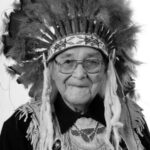 William Commanda
William Commandaor Ojshigkwanàng
Algonquin, Kitigàn-zìbì Anishinàbeg First Nation
Canada
(1913-2011)
It’s all spirit and its all connected . . . Our choice is to live out of harmony with spiritual ways or in harmony with spiritual ways. Everything is spiritual. —William Commanda
In the time of the seventh Fire new people will emerge. They will retrace their steps to find what was left by the side of the trail long ago. Their steps will take them to the Elders, who they will ask to guide them on their journey. But many of the Elders will have fallen asleep. They will awaken to this new time with nothing to offer. Some of the Elders will be silent out of fear. But most of the Elders will be silent because no one will ask anything of them. —William Commanda
We must come together with one heart, one mind, one love, and one determination. —William Commanda
The traditions of our people are handed down from father to son. The Chief is considered to be the most learned and the leader of the tribe. The Doctor, however, is thought to have more inspiration. He is supposed to be in communion with spirits . . . He cures the sick by the laying of hands, and payers and incantations, and heavenly songs. He infuses new life into the patient and performs most wonderful feats of skill in his practice . . . He clothes himself in the skins of young, innocent animals, such as the fawn, and decorated himself with the plumage of harmless birds, such as the dove and hummingbird. —Sarah Winnemucca or Thocmentony “Shell Flower,” Northern Paiute, Great Basin region, USA (ca. 1844-1891)
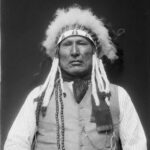 Wooden Leg
Wooden Legor Kâhamâxéveóhtáhe “Eats from His Hand” aka Richard Wooden Leg
Northern Cheyenne
Montana, USA
(ca. 1858-1940)
The old Indian teaching was that it is wrong to tear loose from its place on the earth anything that may be growing there. It may be cut off, but it should not be uprooted. The trees and the grass have spirits. Whatever one of such growth may be destroyed by some good Indian, his act is done in sadness and with a prayer for forgiveness because of his necessities. —Wooden Leg
I want my people to stay with me here. All the dead men will come to life again. Their spirits will come to their bodies again. We must wait here in the homes of our fathers and be ready to meet them in the bosom of our mother. —Wovoka aka Jack Wilson, Paiute, Great Basin region, USA (ca. 1856-1932)
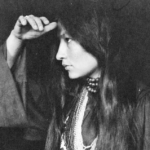 Zitkala-Ša
Zitkala-Šaor Zitkála-Šá “Red Bird” aka Gertrude Simmons Bonnin
Yankton Dakota
Dakota Territory, USA
(1876-1938)
Few there are who have paused to question whether real life or long-lasting death lies beneath this semblance of civilization. —Zitkala-Ša
I was not wholly conscious of myself, but was more keenly alive to the fire within. It was as if I were the activity, and my hands and feet were only experiments for my spirit to work upon. —Zitkala-Ša
The old legends of America belong quite as much to the blue-eyed little patriot as to the black-haired aborigine. And when they are grown tall like the wise grown-ups may they not lack interest in a further study of Indian folklore, a study which so strongly suggests our near kinship with the rest of humanity and points a steady finger toward the great brotherhood of mankind, and by which one is so forcibly impressed with the possible earnestness of life as seen through the teepee door! If it be true that much lies ‘in the eye of the beholder,’ then in the American aborigine as in any other race, sincerity of belief, though it were based upon mere optical illusion, demands a little respect. After all he seems at heart much like other peoples. —Zitkala-Ša
For untold ages the Indian race had not used family names. A new-born child was given a brand-new name. Blue-Star Woman was proud to write her name for which she would not be required to substitute another’s upon her marriage, as is the custom of civilized peoples. —Zitkala-Ša
I seem to be in a spiritual unrest. I hate this eternal tug of war between being ‘wild’ or becoming ‘civilized.’ I am what I am. I owe no apologies to God or men. —Zitkala-Ša
